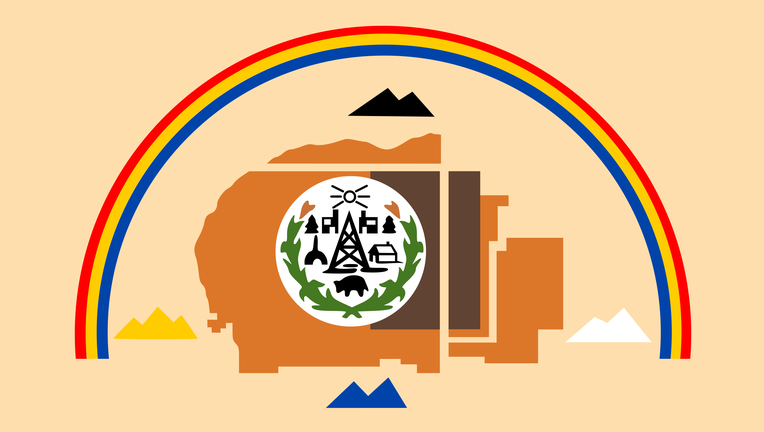Navajo Nation resumes weekend lockdowns as Arizona coronavirus cases rise

Navajo Nation flag
WINDOW ROCK, Ariz. - The Navajo Nation is resuming lockdowns for at least the next two weekends as the number of coronavirus cases off the reservation increases, most notably in Arizona.
Tribal President Jonathan Nez made the announcement Tuesday in a virtual town hall. He cited Arizona, which hit an alarmingly high new daily number of cases with nearly 2,400 — almost double the previous record, in urging people to stay home. Businesses will be closed during the weekend lockdown.
During its peak, the Navajo Nation sent the sickest patients from the reservation to larger hospitals in Arizona and New Mexico. That might not be an option if hospitals in Arizona become overwhelmed with patients, Nez said.
“A second surge, a worse surge, may put a lot of pressure back on our health care system and our health care workers,” Nez said.
Residents on the Navajo Nation are still under daily nighttime curfews. It has been a couple of weeks since they were required to stay home throughout the weekend, from sundown Friday to sunrise Monday. Tribal police have been citing people for violating the lockdown.
Masks also must be worn in public on the reservation. Tribal government offices remain closed to the public.
Late Tuesday, the tribe reported 39 new cases of COVID-19 and eight more deaths. The total number of cases reported was 6,672 with 319 deaths. Health officials said nearly half of those who tested positive have recovered.
For most people, the new coronavirus causes mild or moderate symptoms, such as fever and cough that clear up in two to three weeks. For some, especially older adults and people with existing health problems, it can cause more severe illness, including pneumonia and death.

What you can still often do during a stay at home order
Here is what is most likely allowed during a stay at home order.
In order to protect yourself from a possible infection, the CDC recommends:
- Avoid close contact with people who are sick.
- Avoid touching your eyes, nose, and mouth.
- Stay home when you are sick.
- Cover your cough or sneeze with a tissue, then throw the tissue in the trash.
- Clean and disinfect frequently touched objects and surfaces using a regular household cleaning spray or wipe.
- Wash your hands often with soap and water for at least 20 seconds, especially after going to the bathroom; before eating; and after blowing your nose, coughing, or sneezing.
MAP: Worldwide interactive Coronavirus case data
MAP: Arizona Coronavirus cases by zip code
FULL COVERAGE: fox10phoenix.com/coronavirus
Coronavirus (COVID-19)
How it spreads, symptoms, prevention, treatment, FAQ
https://www.cdc.gov/coronavirus
Arizona COVID-19 Response
Public resources, FAQ, webinars
https://www.azdhs.gov/coronavirus
On CoronavirusNOW.com, you'll find extensive coverage about COVID-19, including breaking news from around the country, exclusive interviews with health officials, and informative content from a variety of public health resources.
RELATED:
- Coronavirus: What to do if you’re told to self-quarantine
- What is a pandemic? This is what the WHO’s global COVID-19 designation means
- Social distancing: What to do and what not to do to slow the spread of COVID-19
Symptoms for coronavirus COVID-19 include fever, coughing, and shortness of breath. These, of course, are similar to the common cold and flu.
Expect a common cold to start out with a sore or scratchy throat, cough, runny and/or stuffy nose. Flu symptoms are more intense and usually come on suddenly, and can include a high fever.
Symptoms of COVID-19 may appear more slowly. They usually include fever, a dry cough, and noticeable shortness of breath, according to the World Health Organization. A minority of cases develop pneumonia, and the disease is especially worrisome for the elderly and those with other medical problems such as high blood pressure, obesity, diabetes, or heart conditions.
RELATED: Is it the flu, a cold or COVID-19? Different viruses present similar symptoms
Right now there's one big difference between flu and coronavirus: A vaccine exists to help prevent the flu and it's not too late to get it. It won't protect you from catching the coronavirus but may put you in a better position to fight it.
To protect yourself, wash your hands well and often, keep them away from your face, and avoid crowds and standing close to people.
And if you do find yourself showing any of these flu or coronavirus symptoms - don't go straight to your doctor's office. That just risks making more people sick, officials urge. Call ahead, and ask if you need to be seen and where.

